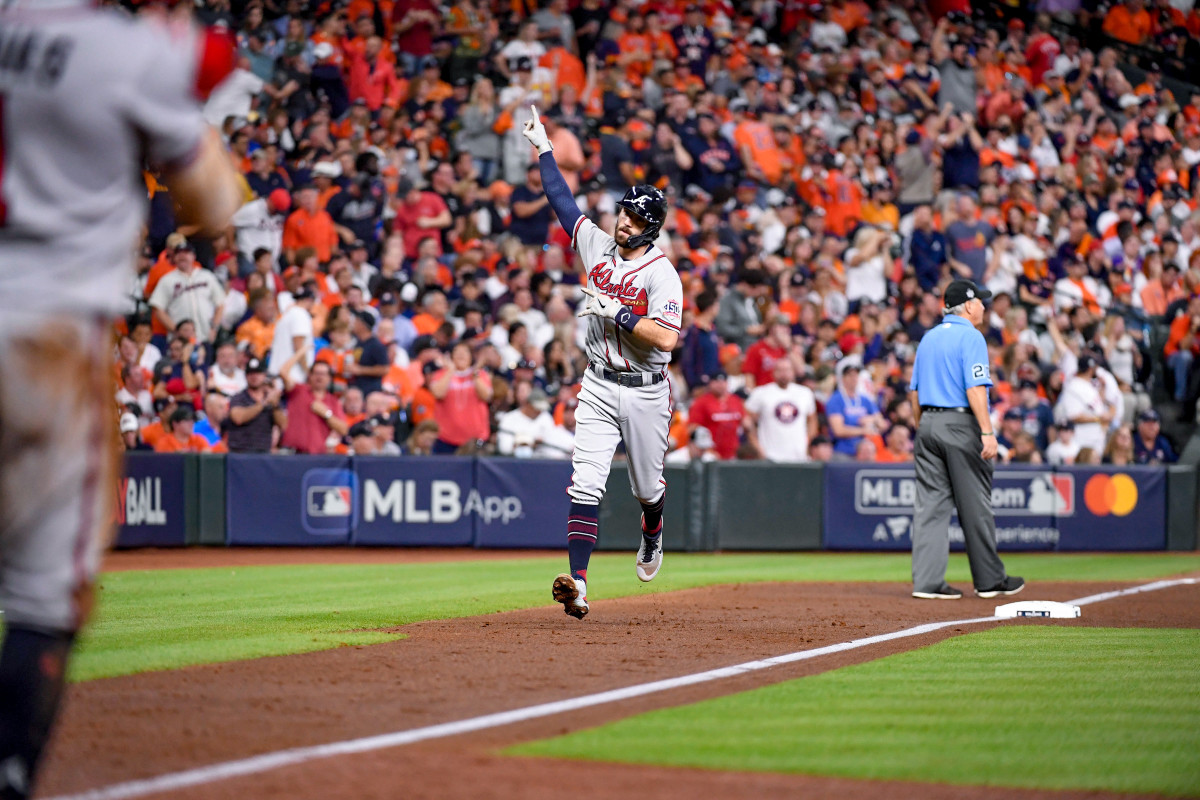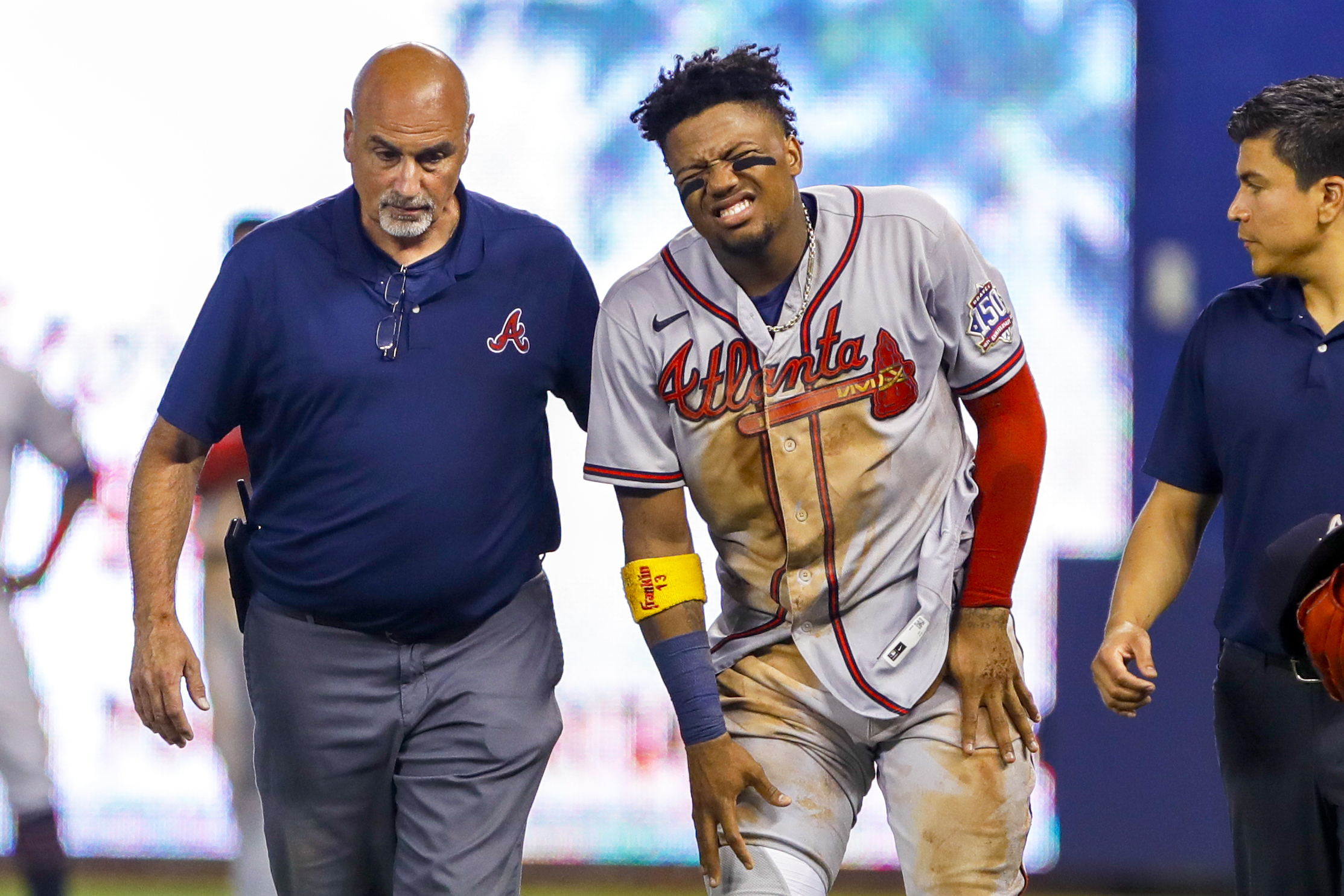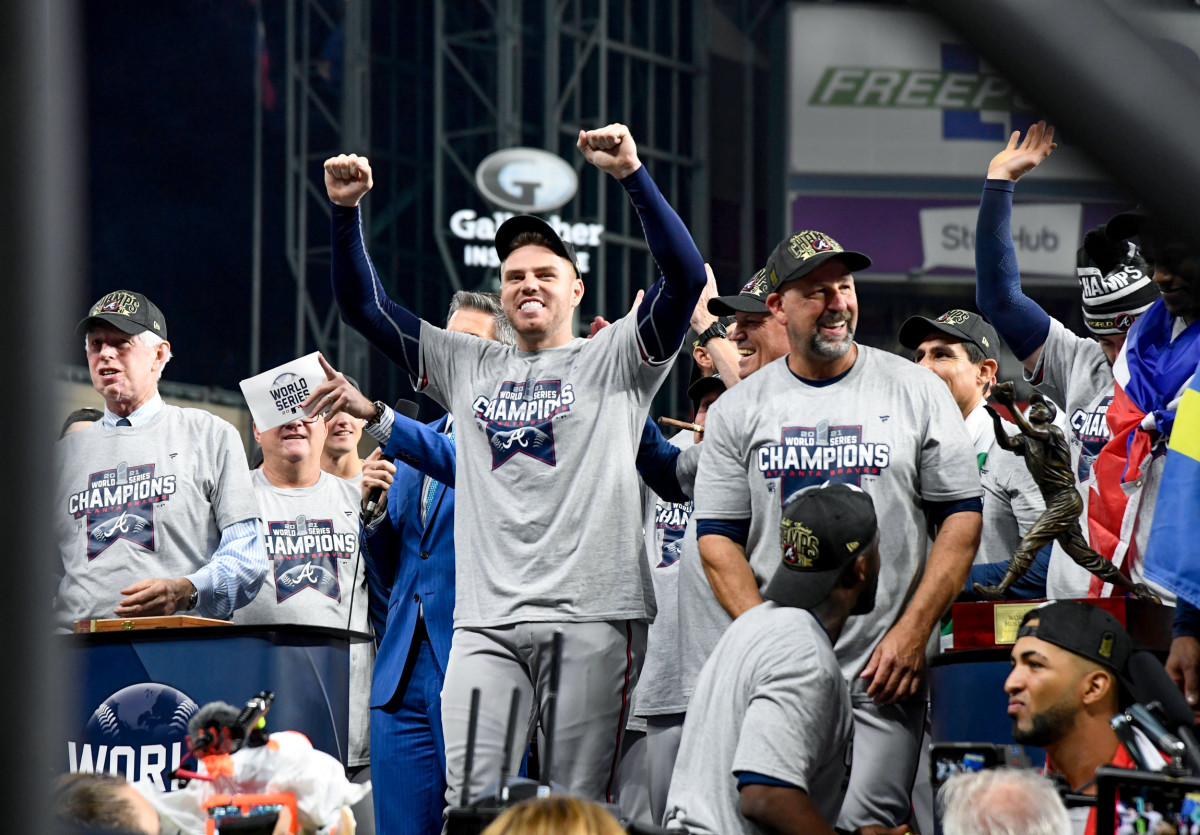Narrative No More! Braves Kill Curse in City That Haunts Atlanta Sports the Most.
Before the World Series, Braves shortstop Dansby Swanson was asked a question that he did not particularly want to answer.
In addition to playing a sport with a historic, bone-deep inclination toward superstition, he had a personal tendency toward it: At the end of April, for example, after his team had gotten off to a scuffling start, Swanson was seen burning sage in the clubhouse. (The Braves won their next three games.) If you took that action to mean that he placed stock in curses, or vibes, or some other nebulous forms of energy, it was natural to ask him how he felt about the Braves’ playing for the championship in Houston, which happened to be the site of a certain local football squad’s notorious demise four short years ago.
Did the return to Houston have him ready to break out the sage again?
"I can’t even answer that," Swanson says.

He shouldn’t have had to: There was, of course, no logical connection between the 2021 Braves and the ’16 Falcons or any of the history that had given Atlanta its reputation as a tortured sports city. But it was easy to see how people could feel otherwise. Atlanta’s championship record in big-four men’s sports seemed too absurd, too personal, to feel as if it was anything but cursed.
The Braves had not taken home a title in a generation, despite the fact that they had won more games than any other team in the National League from 1996 to 2020. The Hawks had made almost three dozen playoff runs since moving to town half a century ago, but they have never reached an NBA Finals, let alone won one. The Thrashers appeared in one NHL playoff series in their 11 seasons in town before relocating to Winnipeg. Then there are Swanson’s beloved Falcons, authors of the toughest loss of all. The young shortstop had traveled to Houston in 2017 for Super Bowl LII, and he saw his team blow that 28–3 lead to the Patriots.
None of that history had any bearing on the 2021 Braves—or, at least, none of it rationally should have. ("This is a few years later and a completely different sport," Swanson says of playing for a championship in Houston, taking pains to spell out just how silly the whole thing sounded.) But the infielder, who grew up in Marietta, Ga., understood the psychic wounds behind the reporter’s question. And whether or not the idea of an Atlanta title curse made sense, it didn’t change how a World Series loss—or, for that matter, a World Series win—would be received by fans.
To lose would be to offer yet another data point in this tale of futility. To win, meanwhile, would be to kill the narrative.
Get SI’s Atlanta Braves World Series Champions commemorative issue here.
Swanson knew that. So when the Braves had won the World Series and he stood before the cameras after Game 6 at Minute Maid Park, soaked in champagne, grin plastered to his face—he could not help but to circle back to the football game that he had watched in this city four years earlier.
"It kind of feels like no better story could be written than God making us come back here and winning the World Series in Houston," he said. "Everything comes full circle."
The idea of an Atlanta title curse was built around teams that lost when they had been expected to win. But this Braves team was closer to the opposite: It won when it had been expected to lose.
That’s a common refrain for a championship team—"No one thought we were going to be here, and man, look at us now!" But there was an uncommon truth to it for the 2021 Braves. For them, such a line seems not like an exaggerated chip on the shoulder, but a simple acknowledgement of fact. They had the most losses of any team that made the playoffs this season.

They were a few games under .500 as late as August. They had watched an injury take out a player who was not just one of the best on the team, but one of the best in the sport, when NL MVP front-runner Ronald Acuña Jr. tore his ACL in July. The struggles kept coming even deep into October: When ace Charlie Morton fractured his leg on a comebacker in Game 1 of the World Series, it left the team with just two true starting pitchers.
Yet the Braves won, and they kept winning. Part of that was simple talent. Part was the steady presence of Atlanta manager Brian Snitker. Part was front-office savvy—a torrid second half would not have been possible without the decision to rebuild the outfield at the trade deadline. And part was the peculiar mix of timing and luck that is required for any championship—an ingredient that had been missing in one playoff run after another for Atlanta. Yet here it was in October 2021. At exactly the right time, with just the right combination of skills, the Braves had played their best baseball of the year.
Which is to say—yes, maybe no one thought they were going to be here. But, man, look at them now.
If Swanson came by his understanding of the Atlanta sports fan psyche from birth, then Freddie Freeman was drafted into his. The California native became the face of the franchise not too long after his debut in 2010. He has played long enough now to serve as a bridge across different eras of the organization—he started out playing under Bobby Cox—and he has never suited up for another major league club. Through more than a decade with the team, he has lived through every variation of good season and bad, and he has internalized what those wins and losses can mean to Atlanta.

This means that it is Freeman, more than anyone on this roster, who has been asked over the years to answer for how the Braves might fit the tortured sports legacy of the city. In the early-morning hours of Nov. 3, 2021, he finally got a different variation on that question: "How good does it feel to know we’ll never be able to ask you about the Atlanta sports narrative?"
Freeman could only beam.
“We killed the narrative,” he says. “And we get to kill it for a long time."
More Braves Coverage:
• Dues Paid in Full, the Braves Are World Champions
• Max Fried Finds Another Level to Win It for Atlanta
• Brian Snitker Is Old-School. He Doesn't Embrace Analytics. And He's Thriving.
• Pearls Before Swing: Meet the Man Behind the Joctober Bling
Get SI’s Atlanta Braves World Series Champions commemorative issue here.
